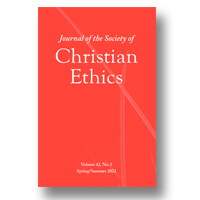A year after writing an article about a movement in South Korea to hold clergymembers accountable for sexual abuse, a theology professor has asked for the paper to be retracted after acknowledging “citation irregularities” in the work. The specific problems remain unclear.
The paper’s retraction notice, dated December 21, 2023, states that the editors of the Journal of the Society of Christian Ethics supported the request to pull the article. Asked for more details about which “irregularities” or other factors might have contributed to the retraction, Maria Teresa Dávila, one of the journal’s editors and an associate professor of religious studies at Merrimack College, in North Andover, Massachusetts, confirmed the retraction and referenced the society’s publishing guidelines and ethics statement, but did not highlight specific passages that would pertain to this specific case. She also refused to answer further questions about the retraction.
The paper’s author, David Kwon of Seattle University, published the article when he was still an assistant professor at Saint Mary’s University of Minnesota. His work centers on gender and racial justice from a global perspective. He did not respond to repeated requests for comment.
The #ChurchToo movement followed swiftly on the heels of the #MeToo movement that started in the United States. That religious reckoning made its way to South Korea, where a corresponding #ChurchToo movement exposed priests and pastors with histories of committing sexual abuse.
Kwon’s article, “Clergy Sexual Abuse and an Ethics of Recognition: An Example of the #ChurchToo Movement in South Korea,” provided philosophical frameworks and strategies for ensuring the longevity of this push for gender justice for women in Korean Christianity:
The hashtag activism Korean #ChurchToo must transform into an assembly in the street. This transformation has the potential to help the Korean church to break free from the grip of oppressive social norms, structures, and ritualized patterns that render women and minority genders’ bodily lives more precarious.
The paper has yet to be cited, according to Clarivate’s Web of Science.
Like Retraction Watch? You can make a tax-deductible contribution to support our work, subscribe to our free daily digest or paid weekly update, follow us on Twitter, like us on Facebook, or add us to your RSS reader. If you find a retraction that’s not in The Retraction Watch Database, you can let us know here. For comments or feedback, email us at [email protected].
